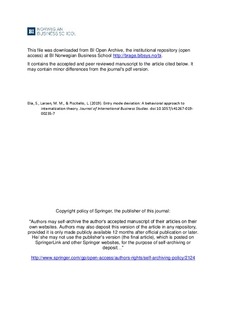Entry mode deviation: A behavioral approach to internalization theory
Journal article, Peer reviewed
Accepted version
Permanent lenke
http://hdl.handle.net/11250/2596549Utgivelsesdato
2019Metadata
Vis full innførselSamlinger
- Publikasjoner fra CRIStin - BI [1015]
- Scientific articles [2181]
Originalversjon
10.1057/s41267-019-00235-7Sammendrag
We explore when and why decision makers choose international entry modes (e.g., hierarchies or markets) that deviate from internalization theory’s predictions. By applying a cognitive perspective on entry mode decision making, we propose that the performance of prior international activities influences decision makers’ behavior in different ways than assumed in internalization theory. More specifically, due to a representativeness bias, underperforming (overperforming) past ventures influence the decision to change (continue using) the previous entry mode choice, which may result in an entry mode deviation. In addition, the propensity to deviate from theoretical predictions is stronger when the experience is recent and/or salient due to an availability bias. In conclusion, we argue that internalization theory can benefit from incorporating more systematically important behavioral assumptions on how firms enter international markets. In so doing, we contribute to the recent conversation on how variations in human behavior influence internalization theory.
